The Colombia Free Trade Agreement opens Colombia to foreign corporations and investment, creating an improved environment for the exploitation of natural resources and labor. Union leaders, activists, farmers, indigenous and Afro-Colombian peoples are paying the price – in blood.
Colombian President Juan Manuel Santos has restarted talks with the country’s main guerilla group, the Revolutionary Armed Forces of Colombia (FARC) – for which he’s received laudatory press outside of the country, and a more cautious response inside it.
The government and FARC representatives will hold their first meeting October 8 in Oslo. London’s Financial Times called Santos “a strategic thinker with canny political antennas,” and praised him for establishing “business-friendly policies” leading to economic growth fueled by rising foreign investment.
Colombia’s key business-friendly policy has been the negotiation of a free trade agreement with the United States, begun by Santos’ predecessor, Alvaro Uribe. In May, US President Barack Obama gave Colombia a clean bill of health, and allowed the US-Colombia Free Trade Agreement to go into effect. Opening Colombia to foreign corporations and investment, however, has had a bloody price, paid by its union leaders, farmers and social movement activists. Uribe and Santos promised the treaty signaled an end to the killings, but attacks on movement leaders continue, nonetheless.
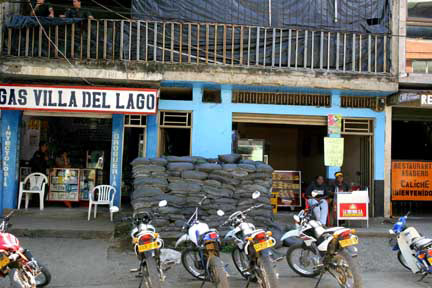
SUAREZ, COLOMBIA – The Colombian military maintains an armed fort, called a “trincheras,” in the middle of Suarez, near the damn on the Rio Salvajina. When the river was damned in 1984, thousands of families were displaced, and the army was accused of assassinating local activists in order to force them to leave. Since then, the area has had a permanent military presence.
Before the treaty was signed, businesses operating in Colombia (including US corporations like Exxon and Drummond Coal), already had duty-free access to the US market for most goods. When the agreement went into effect, US exporters of manufactured goods and agricultural products gained duty-free access to the market in Colombia.
US miners lost jobs when Drummond Coal began supplying the generating stations of Alabama Power with Colombian coal. Now Colombian farmers and workers are suffering the same displacing fate as US exports flood Colombia. In addition to opening the Colombian market, the agreement also facilitates investment in large mines and other megaprojects, leading to the uprooting of rural communities, and the privatization of public services.
The consequences of these neoliberal policies have been devastating for many sections of Colombian society – from Afro-Colombian communities, to trade unionists. In January, three Afro-Colombian organizations joined with the Washington Office on Latin America to write to the US Congress, outlining the dangers their communities face in the province of Cauca.
In an effort to convince Congress that the guerilla war in Colombia was winding down, and thereby set the stage for negotiating the FTA, former President Uribe announced the “demobilization” of right-wing paramilitary groups that have terrorized community activists and trade unionists for more than two decades. In their letter, the three Afro-Colombian leaders call the demobilization a sham. “In 2004 and 2005,” they say, “paramilitaries operating in this area participated in a deeply flawed demobilization process with the government. The demobilization and reintegration process did not put an end to the violence. Many of these men left the AUC paramilitaries to create new groups with a very similar modus operandi and agenda, such as the Black Eagles and Rastrojos…. In many cases, locals identify these men as the same ones who demobilized … “
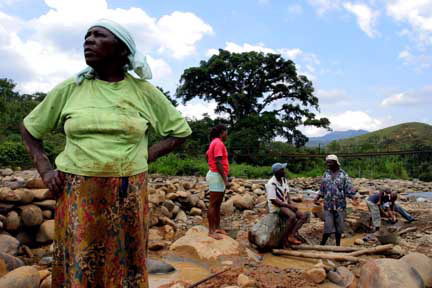
RIO OVEJAS, COLOMBIA – Development projects have brought massacres here by Colombia’s paramilitary and groups who protect the projects, and who seek to push communities here off their land.
In this area of Colombia, settled by fleeing African slaves centuries ago, foreign corporations have begun to develop industrial gold mines and hydroelectric power projects.
“Companies interested in exploiting natural resources in northern Cauca took advantage of the conflict and insecurity to expand their operations,” the letter continues. “By 2009, there were 35 mining concessions in the municipalities of Suarez and Buenos Aires.” In addition, the Spanish company Union Fenosa was involved in developing a huge dam project in the same region.
Paramilitaries then began terrorizing community leaders in Suarez, Buenos Aires and La Toma to force people to give up their land. The letter-signers – Clemencia Carabali of ASOM, Francia Marquez of the Community Council of La Toma, Charo Mina Rojas of the Black Communities’ Process International Working Group, joined by Gimena Sanchez and Anthony Dest of the Washington Office on Latin America – say paramilitary violence is connected to these corporate megaprojects.
Undermining the historical rights of Afro-Colombian communities, and displacing their residents, creates the space for investors to move in. “The violation of Afro-Colombians’ constitutional rights will be exacerbated with the implementation of the US-Colombia FTA,” they warned.
In an interview, Carabali recalled the impact of dam construction. “My family was affected just like hundreds of other families living in that community,” she recalled, “because many lost their farms, which was their main source of sustenance. Their strong sense of community was lost along with loved ones who were either murdered or were displaced. It was a huge loss.”
Carabali says the military and paramilitaries cooperated with the same goal – making people leave. “They were forced to leave because they were threatened,” she said. “The multinational company told hundreds of families who lived within 18 kilometers, which is the amount of land needed in order to build the dam, that if they didn’t leave, their homes would be flooded, with all of their belongings. In some cases, community leaders were also killed. The military came in and would cart off people to never be seen again. This put fear in many people and they gathered their belonging and left.”
The company, she said, was the Regional Corporation of the Caoca River Valley, which had stock from Union Fenosa.
The armed organizations of supposedly demobilized paramilitaries have also taken aim at the country’s trade unionists. Two leaders of the union for workers at Coca-Cola bottling plants, SINALTRAINAL, have not only been targets in the past, but are now threatened with prison by prosecutors who have recruited these paramilitaries to give testimony against them.
Juan Carlos Galvis and William Mendoza have been charged with “terrorism,” allegedly as a result of a bomb blast in the local bottling plant 14 years ago. The witnesses lined up by the prosecutor are paramilitaries, now in prison for the murders of labor and social movement activists.
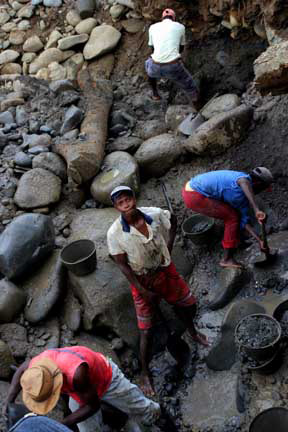
RIO OVEJAS, COLOMBIA – Afro-Colombian and indigenous Columbian small-scale gold miners live in a community on the Rio Ovejas threatened by large scale development projects, including a gold mining complex and the flooding of the valley by a new dam and hydroelectric project.
“Once the free trade agreement was signed, the government wasn’t afraid anymore that a vote in the US Congress might go against them,” Mendoza says. “We’ve denounced the paramilitaries and the killings for years, and charged [former Colombian President] Uribe with illegal connections to them. And the Colombian government has tried to use false accusations against us before too. But if they can put us in jail this time, it will be a death sentence. We’ll never come out alive.”
Three men accuse Galvis and Mendoza. One, Rodrigo Perez Alzate, is the commander of a paramilitary group called the “Central Bolivar Bloc,” referring to its control over the geographic area around Barrancabermeja. He’s in prison because he confessed to 45 murders. Perez says Galvis is a sympathizer with armed guerillas, an accusation historically used against unionists and social movement activists to make them targets.
The second, Wilfred Martinez Giraldo, was in charge of paramilitaries in Barrancabermeja and reported to Perez, while the third, Saul Rincon, who worked as a guard at the bottling plant and was nicknamed “Coca Cola,” reported to Martinez. He’s in prison for murdering Rafael Jaimes Torra, the treasurer of the Oil Workers Union (USO) local in Barrancabermeja.
“They say,” Mendoza explains, “that a bomb blast, which was probably set off by the EPL [one of Colombia’s guerrilla groups], was used by the union to pressure the company into making concessions. But that year we actually had to give the company concessions to keep them from closing the plant. We had no connection to the bombing, and had nothing to gain from it. The whole accusation against us was fabricated years later, and doesn’t even make sense.”
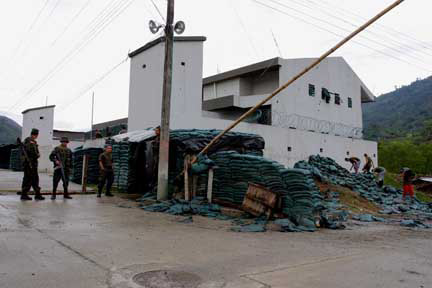
TORIBIO, COLOMBIA – Young soldiers move sandbags used to protect the police station in Toribio. Indigenous Columbians were forced off their land in the Rio Cauca Valley, and resettled in the mountain community of Toribio. Large landowners, the Colombian army and paramilitaries terrorized people to push their communities here off their land. The army has a large presence in Toribio, to suppress coca growing and fight guerillas of the Revolutionary Armed Forces of Colombia (FARC). After soldiers killed a child, indigenous inhabitants of Toribio forced the army to take down its encampment in town, and retreat to the local police station, which is frequently attacked by guerillas.
In November of 2011, six months before the FTA took effect, paramilitaries invaded the Galvis home in Barrancabermeja. Two black-clad individuals, their faces hidden by motorcycle helmets, held a gun to the head of Mayra Rojas Vargas, Galvis’ daughter, and told her mother they’d kill her if she screamed. Another child was bound and gagged. Then the pair demanded to know where Galvis and his son were. When the family couldn’t tell them, they spray painted slogans on the walls, and even on the face and hair of Galvis’ wife, Mary Jackeline Rojas Castenada, an activist in the Popular Women’s Movement.
Both Galvis and Mendoza have been threatened and attacked for years, because they are leaders of SINALTRAINAL, the union for Colombia’s Coca-Cola plant workers. In 2003, Galvis’ car was shot up after he got a threat from a paramilitary group called “Death to Unionists.” Mendoza’s wife foiled an attempt to kidnap his young daughter in a public park the year before.
After that, Mendoza moved his family away from the city, as Galvis did following the home invasion. But they will not leave Barrancabermeja themselves.
On August 17 of this year, the Magdalena Medio Bloc of the Rastrojos distributed a leaflet in Barrancabermeja that announced: “We are not playing around. It is our last warning to guerrilla organizations that hide behind the rhetoric of defenders of human rights.” It identifies SINALTRAINAL by name, and goes on to say, “We declare our objective to be a death sentence…. We have William Mendoza, the guerrilla leader, well identified.”
The Observatory for Protection of the Defenders of Human Rights, a cooperative program of the World Organization Against Torture and the International Human Rights Federation, says, “Criminalization of the unionists’ activities is part of a systematic policy of persecution against members of SINALTRAINAL, who have been repeatedly victims of assassinations, attempts on their lives, torture, death threats, displacement, exile, the burning of union offices and attempts to kidnap members of their families, and that they continue to be threatened.”
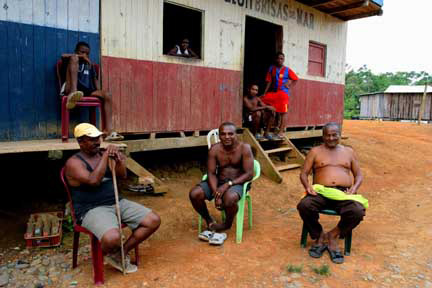
TUMACO, COLOMBIA – In Narino department, Afro-Colombian families are trying to implement the 1991 Constitution and Law 70, which guarantees them the land on which they have historically lived. Many communities have been displaced by the expansion of oil palm plantations, and by Colombia’s paramilitary and military groups who protect the projects. In this area near Tumaco, Afro-Colombians have recovered part of their lands, and seek to force palm growers to give up the rest. Residents of a tiny village in the jungle and palm plantations, on land recovered by the Afro-Colombian community.
In 1996, Isidro Segundo Gil was shot by paramilitaries outside the Coca-Cola bottling plant in Carepa. Afterwards, they were given access to the plant by managers. They called the workers together and told them that if they didn’t resign from the union, the same thing would happen to them. SINALTRAINAL was at the time in contract negotiations with Bebidas y Alimentos, Coca-Cola’s contract bottler in Colombia.
Two SINALTRAINAL activists had been murdered in Carepa two years earlier. In 1989, Jose Avelino Chicano was killed in the Coca-Cola Pasto plant. In 2001, again during negotiations, a union leader at the Bucaramanga plant, Oscar Dario Soto Polo, was murdered.
When the union denounced the killings, the plant’s chief of security, Jose Alejo Aponte, charged its leaders with terrorism and rebellion. Five were arrested and jailed for six months. At the Barrancabermeja plant, graffiti was scrawled on the walls – “Get Out Galvis From Coca-Cola, Signed AUC [the initials of the paramilitary Self Defense Forces].”
When Colombian courts wouldn’t act to identify and punish the murderers of trade unionists, SINALTRAINAL went into US courts in Florida in 2000 with the United Steel Workers and the International Labor Rights Fund, charging Coca-Cola with responsibility under the Alien Tort Claims Act. The USW charged that Coke bottlers “contracted with, or otherwise directed paramilitary security forces that utilize extreme violence and murdered, tortured, unlawfully detained or otherwise silenced trade union leaders.” The company’s functionaries have compared union protest with guerrilla activity, according to the Observatory.
Eventually, the Florida court declared that Coke had no control over its Colombian bottlers, and threw the case out. But it gained such publicity and support in US unions that negotiators of the free trade agreement were forced to include some concession they alleged would stop the killings. In 2011, the year of the Galvis home invasion, 27 union activists and leaders were murdered, and 51 the year before, according to Colombia’s National Labor College.
Coca-Cola closed its Barrancabermeja plant in 2003. But today another bottler, the Industria Nacional de Gaseosas, has 8200 employees. Workers are divided between a number of unions, “but the company hates SINALTRAINAL, since we are the ones who protested the most and pissed them off the most,” Mendoza says. “Coca Cola wants to get rid of SINALTRAINAL, which would allow it to lower the conditions for workers in the plants,” Mendoza said. “Workers would lose all the things they’ve won in the past. That would increase profits substantially. The first thing the company did after getting rid of the union [in Carepa] was terminate all the permanent workers in the plant. All the rights in the union contract were lost, and they hired temporary workers at much lower salaries – minimum wage with no benefits.”
Coke, Industria Nacional de Gaseosas and other Colombian employers have another means to attack and weaken unions as well – the casualization of the workforce. Instead of direct employment, workers are contracted through “cooperatives of associated workers.” Employers then impose salaries and benefits to prevent workers from organizing unions. Coca-Cola plants, according to Mendoza, use a firm called Proservice Limitada.
Both the killings and the use of “labor cooperatives” were supposed to end as a result of the Labor Action Plan, a program put into effect by the Colombian government to halt criticism in the US Congress and win approval of the FTA. Instead of protecting labor and community activists, however, the trade agreement’s implementation seems to have given the Colombian government a free hand in resuming attacks on them.
According to an AFL-CIO report, “Because the Labor Action Plan is not part of the trade agreement, some of its provisions will likely be difficult to enforce if the government of Colombia fails to fully comply with plan commitments.” And the LAP has no commitment to collective bargaining in the public sector or collective bargaining over pensions.
Nor has the LAP stopped the murders. Jhonsson Torres, a member of the cane cutters union, SINALCORTEROS, told a hearing in Washington, DC, in June that Daniel Aguirre, the union’s general secretary, was assassinated on April 27. “After our two-month strike was able to improve working conditions, the Colombian government charged several of us and our allies with conspiracy and sedition,” he declared.
The union that has suffered the most murders this year is FENSUAGRO, Colombia’s largest union for farm workers. Five of its members in Toribio and Miranda, in Cauca state, have been killed. The attacks on FENSUAGRO have been so violent that Leo Girard, president of the United Steel Workers, wrote a letter on behalf of his union and the UK union UNITE, to the Colombian government demanding that they stop.
FENSUAGRO’s involvement in the Patriotic March peace process, Girard says, has made it a target “for extreme violence, including the assassination of its leaders, because of both its labor and peace activism. In some cases, it appears that the Colombian military itself may be involved in this violence against FENSUAGRO.”
In one incident, union activist Gerardo Martinez was killed just outside an army camp. “His body was found the following day on a nearby farm,” Girard says. “He had been shot five times, twice in the head, and his body showed signs of having been tortured before being murdered.” Later that month Gustavo Londono, head of the union’s human rights department, was shot as well.
To Edgar Paez, SINALTRAINAL’s international representative, “the paramilitaries are a project of the state to protect transnational corporations in Colombia. That means getting rid of unions and anyone else speaking up to protest. If you look at who the victims are, you find leaders of social protests, unionists, defenders of human rights, women. Anyone who raises their voice with a different vision is a candidate for assassination.” The objective, he says, is “a much more favorable environment for the exploitation of our natural resources and our labor force. But by strengthening our ties with the Steel Workers and the AFL-CIO, we’re giving our own global answer to the globalization of the corporations.”
We have 10 days to raise $50,000 — we’re counting on your support!
For those who care about justice, liberation and even the very survival of our species, we must remember our power to take action.
We won’t pretend it’s the only thing you can or should do, but one small step is to pitch in to support Truthout — as one of the last remaining truly independent, nonprofit, reader-funded news platforms, your gift will help keep the facts flowing freely.
